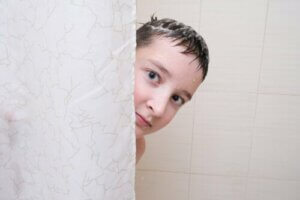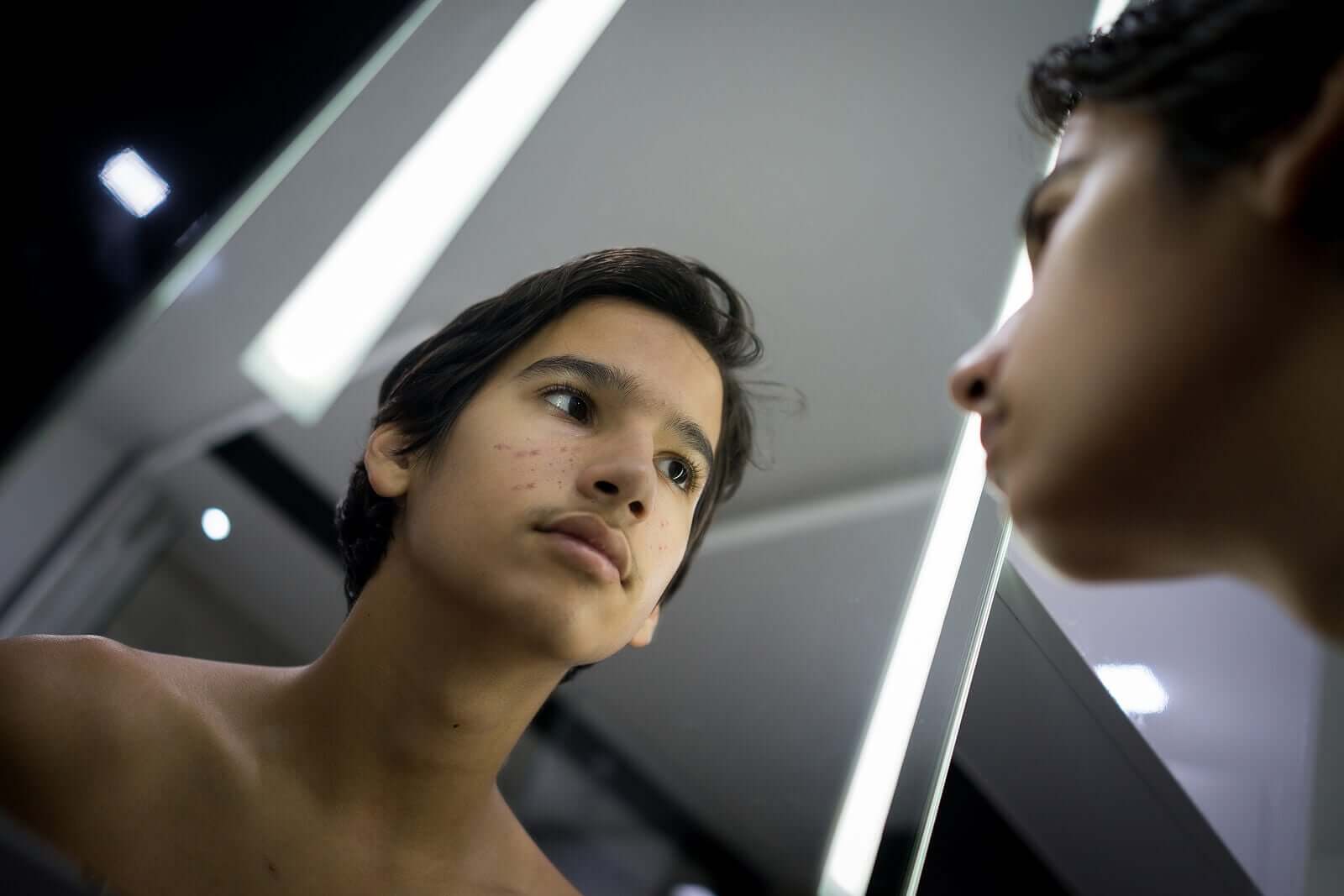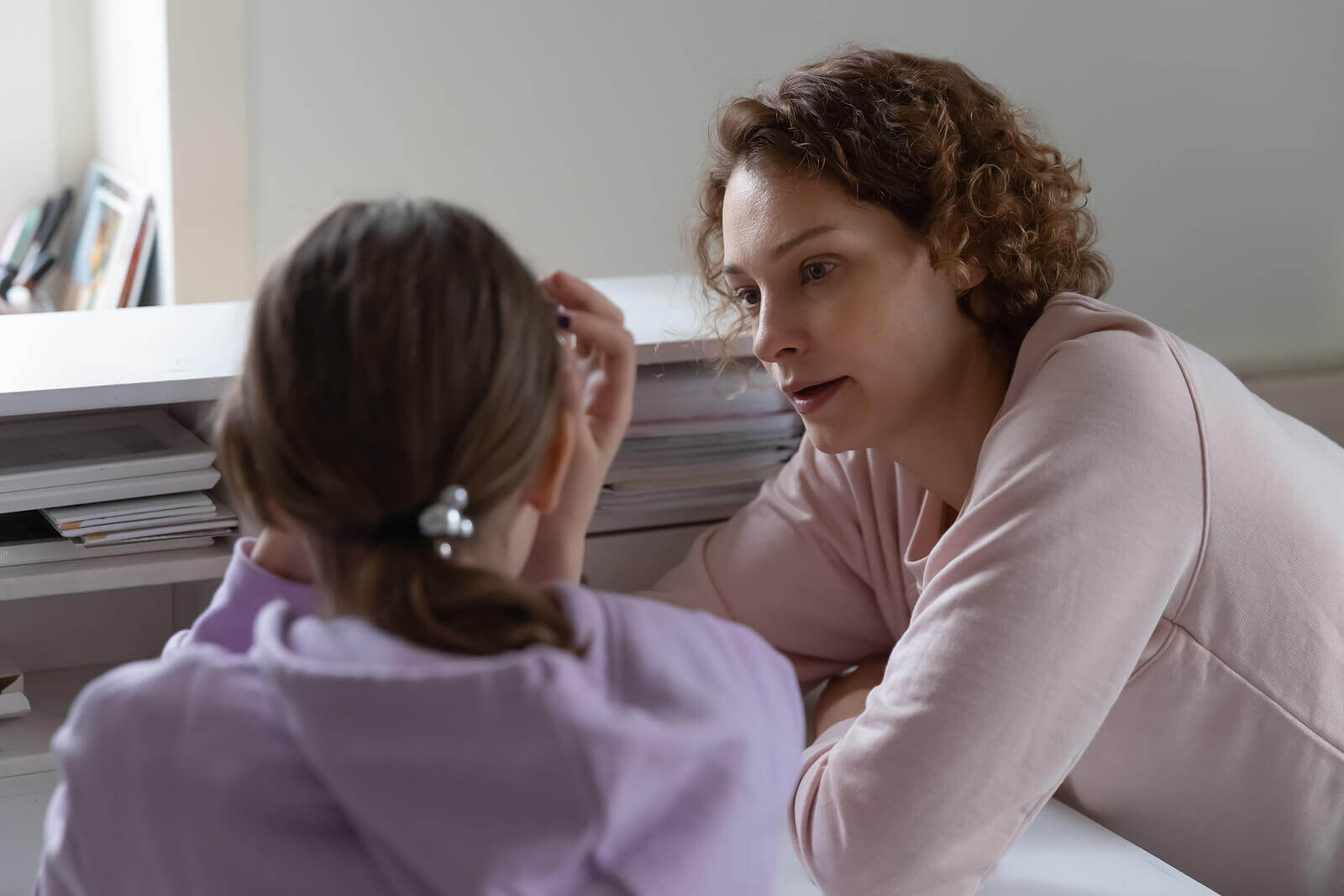Lack of Hygiene in Adolescents: What to Do?

With the arrival of puberty, many young people begin to neglect their personal hygiene. For parents, it’s a continuous struggle to get children to bathe or brush their teeth, and conflicts at home begin to increase. If, as a mother, you find yourself in this situation, you should know that this is a relatively common occurrence. In this article, we’re going to analyze the causes of lack of hygiene in adolescents and what to do about it.
It’s not pleasant to have to go after your child every day insisting that they wash up. After months of trying and insisting, patience runs low and, for the same reason, many parents approach the subject by attacking their teenager.
However, this strategy only succeeds in putting the young person on the defensive and widening the gap between parents and children. Let’s begin, then, by understanding what’s happening.

How do children learn about personal hygiene?
The task of educating children on hygiene and personal care falls mainly on families, even though support can also come from schools. Thus, during childhood, children learn the basics of personal hygiene and its importance. But there are also other influential factors. Therefore, we could say that adolescent hygiene has to do with the following aspects:
- The example the child perceive within the family. Children observe their reference adults to understand how they should behave. Thus, mom and dad’s hygiene habits set an important pattern that children will acquire and imitate. So, first of all, make sure you practice the behaviors you want to see your children reflect. Your example will go much further than your demands.
- Habits of hygiene that children acquire during childhood. It’s important that, from the time they’re small, children get used to keeping themselves clean and neat. Establishing hygiene routines such as taking a daily shower or brushing teeth after each meal will help create a positive habit of self-care.
- The child’s peer group. With the onset of puberty, family becomes less important in the eyes of the child and they focus on their peers. They’ll be the child’s reference point from now on. Therefore, the values of the group and the attitudes of their friends regarding personal image will play an important role.
What’s the reason behind a lack of hygiene in adolescents?
However, even if we’ve perfectly fulfilled the previous steps during childhood, it’s possible that, when adolescence arrives, the young person refuses to continue with those good habits. Adults tend to assume that it’s due to laziness, carelessness, or a simple need to challenge parents. However, the causes of poor hygiene in adolescents can vary.
First, the young person may have difficulty accepting the physical changes they’re experiencing. Acceptance of self-image is a major issue during puberty. Thus, a young person may avoid caring for and grooming their body because of a sense of rejection.
On the other hand, they may be dealing with problems and worries that overflow and capture their attention and energy. Difficulties at school, conflicts with peers, or early break-ups can make young people so anxious that they can’t maintain good self-care habits.
Similarly, poor hygiene in adolescents can be a sign of serious illnesses such as depression or other mood disorders. If the child is apathetic, depressed, sad, and uninterested, the problem may go beyond hygiene.

How do you address a lack of hygiene in adolescents?
To prevent these problems from occurring, it’s important to talk to young people about the importance of hygiene when they reach puberty. Providing them with clear information and guidelines to follow can be very helpful.
Thus, let us emphasize that personal hygiene not only keeps us healthy but also avoids problems of rejection by others. Likewise, let’s make clear what behaviors and habits are desirable.
Likewise, if we perceive a lack of personal care in our child, we must approach the situation with respect and understanding, without attacking the young person. Let’s ask what’s going on and be willing to listen without judgment. If there’s a problem with body acceptance or a mood disorder, seeking professional help is your best option.
With the arrival of puberty, many young people begin to neglect their personal hygiene. For parents, it’s a continuous struggle to get children to bathe or brush their teeth, and conflicts at home begin to increase. If, as a mother, you find yourself in this situation, you should know that this is a relatively common occurrence. In this article, we’re going to analyze the causes of lack of hygiene in adolescents and what to do about it.
It’s not pleasant to have to go after your child every day insisting that they wash up. After months of trying and insisting, patience runs low and, for the same reason, many parents approach the subject by attacking their teenager.
However, this strategy only succeeds in putting the young person on the defensive and widening the gap between parents and children. Let’s begin, then, by understanding what’s happening.

How do children learn about personal hygiene?
The task of educating children on hygiene and personal care falls mainly on families, even though support can also come from schools. Thus, during childhood, children learn the basics of personal hygiene and its importance. But there are also other influential factors. Therefore, we could say that adolescent hygiene has to do with the following aspects:
- The example the child perceive within the family. Children observe their reference adults to understand how they should behave. Thus, mom and dad’s hygiene habits set an important pattern that children will acquire and imitate. So, first of all, make sure you practice the behaviors you want to see your children reflect. Your example will go much further than your demands.
- Habits of hygiene that children acquire during childhood. It’s important that, from the time they’re small, children get used to keeping themselves clean and neat. Establishing hygiene routines such as taking a daily shower or brushing teeth after each meal will help create a positive habit of self-care.
- The child’s peer group. With the onset of puberty, family becomes less important in the eyes of the child and they focus on their peers. They’ll be the child’s reference point from now on. Therefore, the values of the group and the attitudes of their friends regarding personal image will play an important role.
What’s the reason behind a lack of hygiene in adolescents?
However, even if we’ve perfectly fulfilled the previous steps during childhood, it’s possible that, when adolescence arrives, the young person refuses to continue with those good habits. Adults tend to assume that it’s due to laziness, carelessness, or a simple need to challenge parents. However, the causes of poor hygiene in adolescents can vary.
First, the young person may have difficulty accepting the physical changes they’re experiencing. Acceptance of self-image is a major issue during puberty. Thus, a young person may avoid caring for and grooming their body because of a sense of rejection.
On the other hand, they may be dealing with problems and worries that overflow and capture their attention and energy. Difficulties at school, conflicts with peers, or early break-ups can make young people so anxious that they can’t maintain good self-care habits.
Similarly, poor hygiene in adolescents can be a sign of serious illnesses such as depression or other mood disorders. If the child is apathetic, depressed, sad, and uninterested, the problem may go beyond hygiene.

How do you address a lack of hygiene in adolescents?
To prevent these problems from occurring, it’s important to talk to young people about the importance of hygiene when they reach puberty. Providing them with clear information and guidelines to follow can be very helpful.
Thus, let us emphasize that personal hygiene not only keeps us healthy but also avoids problems of rejection by others. Likewise, let’s make clear what behaviors and habits are desirable.
Likewise, if we perceive a lack of personal care in our child, we must approach the situation with respect and understanding, without attacking the young person. Let’s ask what’s going on and be willing to listen without judgment. If there’s a problem with body acceptance or a mood disorder, seeking professional help is your best option.
All cited sources were thoroughly reviewed by our team to ensure their quality, reliability, currency, and validity. The bibliography of this article was considered reliable and of academic or scientific accuracy.
- Loyola, A. (2013). La importancia de mantener una buena higiene en la adolescencia. http://www.encauzaconsultoria.com/pdf/La%20importancia%20de%20mantener%20una%20buena%20higiene%2016-ene-2018.pdf
- Gimenez, P., Correché, M. S., & Rivarola, M. F. (2013). Autoestima e Imagen Corporal. Estrategias de intervención psicológica para mejorar el bienestar psicológico en pre-adolescentes en una escuela de la ciudad de San Luis, Argentina. Fundamentos en Humanidades, 14(27), 83-93. https://www.redalyc.org/pdf/184/18440029004.pdf
This text is provided for informational purposes only and does not replace consultation with a professional. If in doubt, consult your specialist.








